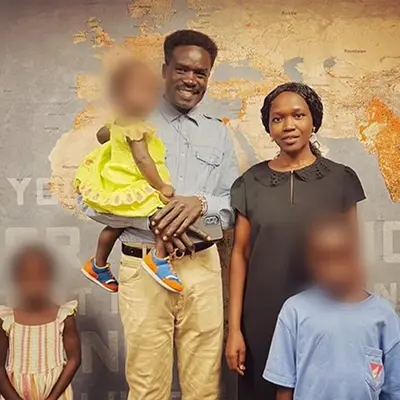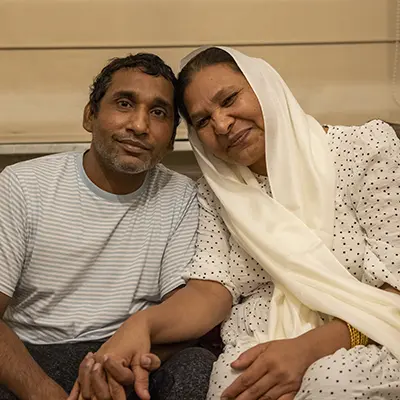Faith communities and parliamentarians take legal action against government-imposed closure of places of worship
COVID-19 restrictions in Uganda continue to discriminate against people of faith
KAMPALA (8 September 2021) – An alliance of Catholic, Evangelical and Muslim faith representatives, along with parliamentarians, have brought a legal challenge to Uganda’s restrictions on public worship because of COVID-19 before the Constitutional Court. This week’s challenge follows similar cases brought by faith communities before Uganda’s High Court and the East African Court of Justice. All aim to have the severe restrictions on public worship overturned. Under current regulations, malls, arcades, and business centers may open, with public transport functioning at 50% capacity. Yet, people are completely prohibited from attending a place of worship.
“People don’t only have physical needs, but also spiritual and emotional needs. At this difficult time, people in Uganda are being denied access to an important source of hope. We are asking that the government stop discriminating against people of faith by disproportionately restricting access to public worship. My church, supported by ADF International, is seeking an end to these draconian restrictions before the High Court to restore freedom of worship in Uganda. We welcome this new challenge before the Constitutional Court, which applies yet more pressure on the government to uphold our fundamental rights,” said Agnes Namaganda, a member of the Christian fellowship supporting the challenge at the High Court that was filed in early August in efforts to re-open her church.
Protecting both public health and freedom of religion
The restrictions on worship, initially imposed on June 18th and renewed on July 30th, are due to last at least 60 days, after which a new review will begin. The restrictions continue what the litigants claim to be discriminatory treatment against faith communities.
“People of faith must not be discriminated against. If going to the mall and eating at restaurants is allowed, people shouldn’t be barred from visiting places of worship. It is essential to ensure both that our communities remain healthy and that the right to gather for worship is upheld. For many, communal worship is an integral part of their faith. It is unacceptable that they should be deprived of this right,” said Tomusange Ismael, a spokesperson for Muslims in Nakawa division, Kampala.
“Freedom of religion and belief is a human right that must be afforded the highest protection. This includes the right to manifest one’s faith in public. It is protected by both Ugandan law and international treaties. There is no reason the government cannot find solutions that protect both public health and communal worship. There is no clear reason why faith groups are held to higher standards than places of commerce. Restrictions on this right must meet the bar of being necessary, legitimate, proportionate, and non-discriminatory. Across Europe, in the US, and Latin America, similar blanket bans on public worship have been ruled unlawful,” said Sean Nelson, Legal Counsel, Global Religious Freedom, for ADF International.
Discriminatory operational hurdles for places of worship
This year’s restrictions have been implemented in a similar manner to restrictions put in place last year. Following an easing of previous lockdown measures in June 2020, places of worship were not allowed to reopen with other similar public places. They had to wait two more months until further consultations could take place between the Ministry of Health and the Inter-Religious Council.
When the doors of churches, mosques, synagogues, and other religious buildings were finally cleared to open in August 2020, they had to adhere to government-enforced Standard Operating Procedures of greater difficulty than regular public places or places of commerce. Faith groups were required to have a team of trained medical personnel attend every worship service, and security guards to ensure that worshippers remained adequately spaced when in line for having their temperature taken upon entry.
A global trend: disproportionate worship bans declared “unlawful”
Human rights group ADF International has supported similar legal challenges against blanket bans on worship across Europe and in Latin America.
In March, Scotland’s top civil court found that a blanket ban on public worship was unlawful. The challenge was successfully brought by 27 faith leaders and a Glasgow Priest, Canon Tom White. The Scottish decision affirmed that any restrictions on fundamental freedoms must be necessary and proportionate. In November 2020, Westminster’s chief medical and scientific advisors had conceded that evidence for church closures was “anecdotal” at best and “not based on scientific fact.”
One day after the Scottish ruling in March, the Chilean Supreme Court unanimously ruled that COVID-19 restrictions have been applied in a discriminatory manner against believers in Chile. The landmark ruling recognized that freedom of religion is a human right that cannot simply be suspended.
Legal action is currently underway in Ireland, where for almost a year, people of faith were criminalized for attending public worship. Leaving one’s home to attend a worship service could have incurred a potential penalty of a fine, or up to six months in prison. To find out more, visit www.letusworship.global/ireland.







